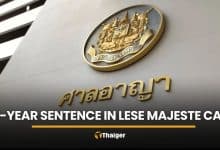Majority oppose Thai amnesty bill in online survey

A significant majority of people surveyed by the Secretariat of the House of Representatives expressed opposition to a bill sponsored by civil society groups that seeks amnesty in political and lese majeste cases dating back to September 2006.
The month-long online survey concluded with 64.66% of participants rejecting the bill, while 35.34% were in favour. Some 90,503 respondents took part in the survey conducted from May 13 until midnight yesterday.
Supporters of the bill have raised concerns over a sudden influx of around 26,000 votes against the bill, suggesting it might have been part of an organised effort. Before this surge, the voting had been nearly even. Deputy speaker of the House, Padipat Suntiphada indicated that the results might need further scrutiny.
“I have ordered an inspection of the IP addresses and any irregularities that occurred on the website and have listened to the opinions of the legal drafters. I will inform everyone of the facts soon.”
The draft bill, proposed by Thai Lawyers for Human Rights representative, Poonsuk Poonsukcharoen, seconded by 36,723 people, was submitted to parliament for consideration. It aims to address related cases from the 2006 coup against Thaksin Shinawatra’s government, up to the present day.
The bill proposes the establishment of a committee to review the cases and decide which ones would be granted instant amnesty. This includes violations under the lese majeste law, orders of the National Council for Peace and Order, and the 2016 referendum law, which restricted the expression of dissenting opinions on a military-drafted constitution.
Review committee
The review committee would consist of 19 members, including the parliament president, opposition leader, chief whip, representatives of all political parties, and representatives of those facing legal action since the 2006 coup.
However, the bill excludes state authorities who used excessive force during political protests and those who violated Section 113 of the Criminal Code, which pertains to acts involving the use of force or threats with the intent to change the constitution, overthrow the legislature, government, or judicial powers, divide the Kingdom of Thailand, or seize administrative power.
An independent academic, Pat Hemasuk urged all political parties to consider the survey results, emphasising that the majority of people do not support granting amnesty to wrongdoers. He cautioned the ruling Pheu Thai Party that pursuing the amnesty bid could result in a loss of seats in the next general election.
The stance of Pheu Thai on the amnesty proposal is under close observation, given that Thaksin Shinawatra, widely regarded as the party’s de facto leader, faces lese majeste and computer crime charges.
Thaksin has reportedly petitioned the Office of the Attorney General for fair treatment, claiming that police were pressured by those in power at the time, a reference to the military regime that staged a coup in 2014.
The debate over the amnesty bill continues to unfold, with significant implications for political dynamics and public sentiment in Thailand, reported Bangkok Post.
Latest Thailand News
Follow The Thaiger on Google News:


























